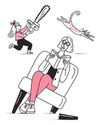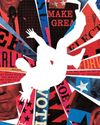
A few episodes into “Our Boys,” Simon, an agent for the Shabak, Israel’s internal security service, talks with two policemen about a case that they are struggling to solve: the death by burning of a sixteen-year-old Palestinian boy. He was abducted in the aftermath of another horrific crime, Hamas’s kidnapping and murder of three Jewish teen-agers—students whose disappearance united Israelis, first in the hope that they would be rescued, and then, once their bodies were discovered, in grief and rage.
Revenge seems to be the likely and logical motive, but the cops reject it. “Jews would never do this,” one of them says, making a dismissive gesture.
“You sure?” Simon asks.
“Yes,” the cop says.
“So is my mother,” Simon says, showing him a text message: “Thank God Jews didn’t do this, take care.”
“Just like my mother,” the second cop replies—and holds up a similar text.
“Let’s recruit them,” Simon says.
It’s the world’s bleakest Jewish-mother joke, a rare moment of humor in “Our Boys,” a galvanic new series on HBO, co-produced with the Israeli network Keshet. Ten episodes long, the show is a partly fictional deconstruction of a hate crime that took place in 2014 and led directly to war in Gaza. It’s a story of family grief and family dysfunction, and also a beautifully paced thriller about a police investigation. But it’s something more ambitious, too: a challenging work of art about the intractable problem of identity—the struggle of any individual to maintain core values, when the world demands nothing but solidarity based on shared victimhood. The show is unusually fearless about letting moral discomfort linger, and manages to be stirring without ever offering false hope, a rarity for even the best-made dramas.
Diese Geschichte stammt aus der September 23, 2019-Ausgabe von The New Yorker.
Starten Sie Ihre 7-tägige kostenlose Testversion von Magzter GOLD, um auf Tausende kuratierte Premium-Storys sowie über 8.000 Zeitschriften und Zeitungen zuzugreifen.
Bereits Abonnent ? Anmelden
Diese Geschichte stammt aus der September 23, 2019-Ausgabe von The New Yorker.
Starten Sie Ihre 7-tägige kostenlose Testversion von Magzter GOLD, um auf Tausende kuratierte Premium-Storys sowie über 8.000 Zeitschriften und Zeitungen zuzugreifen.
Bereits Abonnent? Anmelden

YULE RULES
“Christmas Eve in Miller’s Point.”

COLLISION COURSE
In Devika Rege’ first novel, India enters a troubling new era.

NEW CHAPTER
Is the twentieth-century novel a genre unto itself?

STUCK ON YOU
Pain and pleasure at a tattoo convention.

HEAVY SNOW HAN KANG
Kyungha-ya. That was the entirety of Inseon’s message: my name.

REPRISE
Reckoning with Donald Trump's return to power.

WHAT'S YOUR PARENTING-FAILURE STYLE?
Whether you’re horrifying your teen with nauseating sex-ed analogies or watching TikToks while your toddler eats a bagel from the subway floor, face it: you’re flailing in the vast chasm of your child’s relentless needs.

COLOR INSTINCT
Jadé Fadojutimi, a British painter, sees the world through a prism.

THE FAMILY PLAN
The pro-life movement’ new playbook.

President for Sale - A survey of today's political ads.
On a mid-October Sunday not long ago sun high, wind cool-I was in Harrisburg, Pennsylvania, for a book festival, and I took a stroll. There were few people on the streets-like the population of a lot of capital cities, Harrisburg's swells on weekdays with lawyers and lobbyists and legislative staffers, and dwindles on the weekends. But, on the façades of small businesses and in the doorways of private homes, I could see evidence of political activity. Across from the sparkling Susquehanna River, there was a row of Democratic lawn signs: Malcolm Kenyatta for auditor general, Bob Casey for U.S. Senate, and, most important, in white letters atop a periwinkle not unlike that of the sky, Kamala Harris for President.